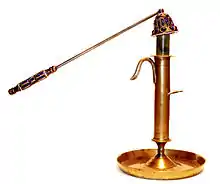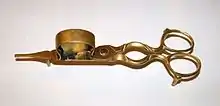Candle snuffer
A candle snuffer, candle extinguisher, or douter is an instrument used to extinguish burning candles, consisting of a small cone at the end of a handle.[1][2][3] The use of a snuffer helps to avoid problems associated with blowing hot wax. Extinguishers are still commonly used in homes and churches.

Description
Candle snuffers date from the 17th–mid 19th centuries. They are scissor-type tools that cut and retain the snuff trimmed from candle wicks. The snuff is partially burned wicks and, with the addition of oxygen, is very flammable, therefore it needed to be isolated so it would not reignite once trimmed from the wick. The simplest and most common form of candle snuffer consists of a pair of scissors with an attached box to retain the snuff. The snuff would be smashed into the box so it would not reignite. Many complex forms of snuffers evolved for the homes with many candles. Some had concentric trap-doors that would snap shut and isolate the snuff. Others would stow the snuff in a lower cavity in the scissors. Similar devices include the douter and the extinguisher, both predating the scissor snuffer.
Historical usage

Before the mid 19th century, the term snuffer referred to a scissors-like device with two flat blades. This tool was used to trim the wick of a candle without extinguishing the flame, to maintain efficient burning. A small receptacle catches the trimmed bit of wick.[4] They were rendered obsolete by the invention of self-snuffing wicks, which curl out of the flame when charred. This allows excess wick to burn away, preventing the wick from becoming too long.
References
| Wikimedia Commons has media related to |
- Candlesnuffer at Dictionary.com
- Extinguisher at Dictionary.com
- Douter at Dictionary.com
- Geake, Helen (17 August 2017). "Candle snuffers and wick trimmers". Portable Antiquities Scheme.